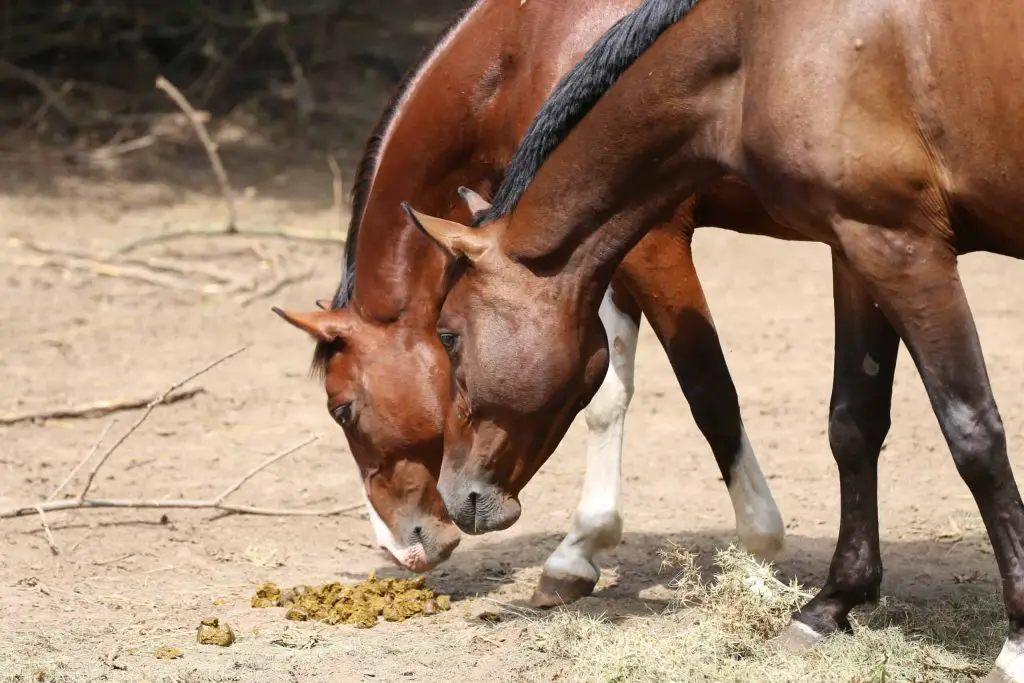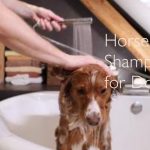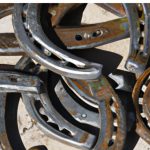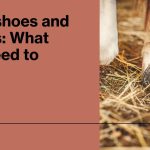Why do horses eat poop? Horses eat their own poop, as well as the poop of other animals, for a variety of reasons. Horses are hindgut fermenters which means they digest food in two stages: first through fermentation and then digestion. Eating their own feces helps them to extract more nutrients from what they consume.
Furthermore, horses may also be supplementing missing minerals or vitamins that are necessary for their health with the help of coprophagy (eating feces). Additionally, horses often eat the dung of herbivores like cows and sheep because it contains undigested parts of plants that can provide extra fiber and nutrition to aid digestion. Finally, eating feces could also indicate an underlying medical problem such as an intestinal parasite infestation or poor diet.
Horses often eat their own poop, known as coprophagy. This behavior is normal and natural for horses in the wild who consume nutrients that they may have not absorbed the first time around. Many horse owners are concerned when they observe this behavior, however, there is no need to worry as it can actually be beneficial for a horse’s health by providing them with additional vitamins, minerals and amino acids that were present in their original meal but could not be fully digested.
How Do I Get My Horse to Stop Eating Poop
One of the most effective methods to get a horse to stop eating poop is to provide them with ample hay and other roughage. This should help fill their stomach so that they are not as tempted to eat their own or other horses’ droppings. It may also be beneficial to keep the area near where your horse grazes clean, as this will reduce the amount of food available for them to snack on.
Additionally, providing plenty of mental stimulation such as turnout time, training sessions and interactive toys can help keep your horse from getting bored and wanting something else more interesting – like poo!
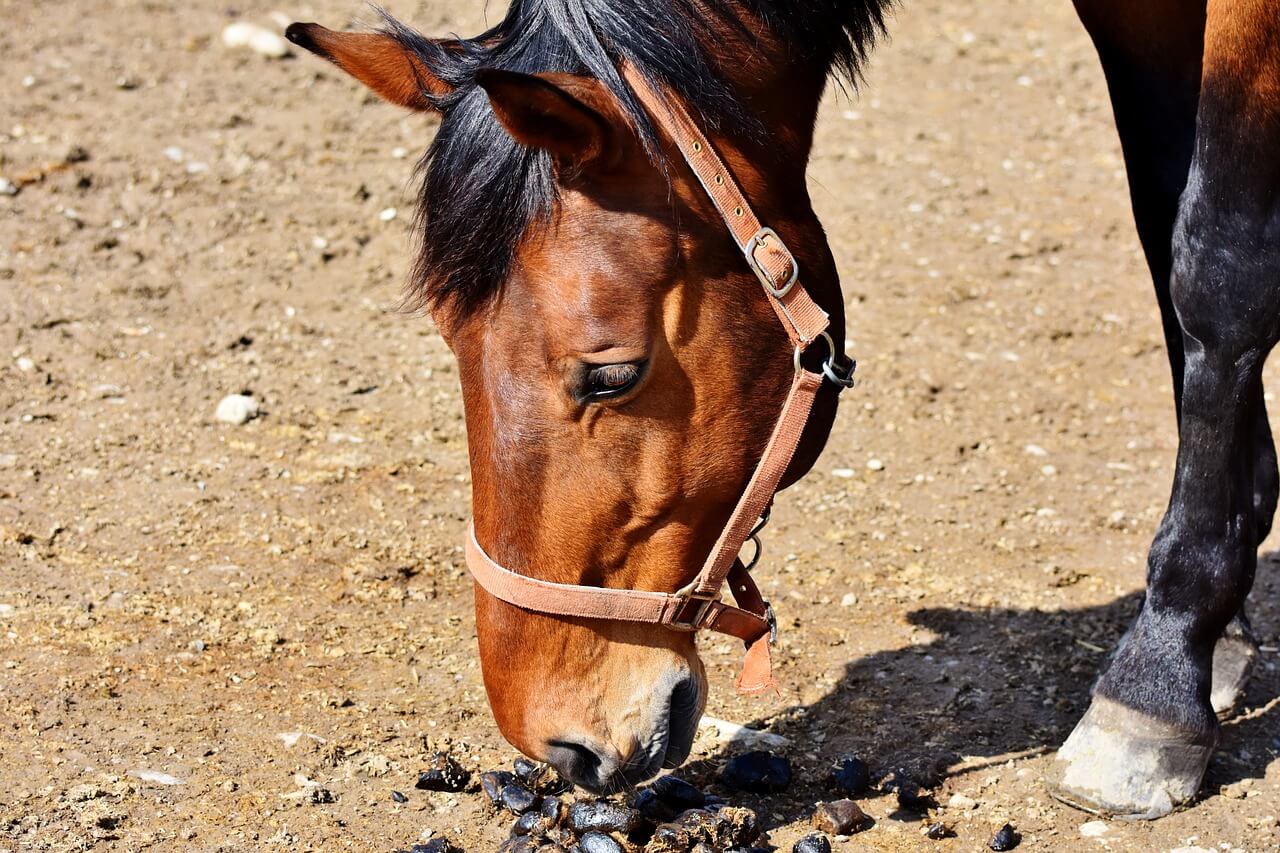
How Do I Get My Horse to Stop Eating Poop?
If you’re having trouble getting your horse to stop eating poop, don’t worry – it’s a very common problem. The first step is to make sure that your horse has access to plenty of hay and other high-fiber feed sources so he doesn’t feel the need to snack on his own droppings. When feeding time comes around, provide him with ample amounts of hay and other safe forage options such as grass or alfalfa pellets.
If possible, avoid offering grain since this can be too tempting for some horses to resist grazing on their own feces instead. Additionally, try providing your horse with more frequent meals throughout the day rather than one large meal in order to help reduce boredom which may lead him back towards sampling his manure pile. Finally, keep his living area as clean as possible by removing old piles of manure quickly before they become an attractive snack option again!
Is Horse Feces Edible?
No, horse feces is not edible to humans and should not be consumed. Horse manure contains a variety of bacteria and parasites that can cause serious illnesses in humans if ingested. It also contains toxins, including heavy metals such as arsenic, lead, copper and others which have been linked to cancer.
Additionally, horses are omnivores who frequently eat plants that contain toxic compounds like alkaloids which could cause further harm when eaten by humans. Therefore it is best to avoid consuming or even being around areas where horse manure has been deposited without proper sanitation procedures in place.
What Do Horse Owners Do With Poop?
Horse owners are responsible for the well-being of their horses, and this includes cleaning up after them. Horse poop is a natural by-product of owning a horse and needs to be disposed of properly. Fortunately, there are several ways that horse owners can deal with their animal’s manure in an effective and convenient way.
Common methods include scooping it away using pooper scoopers or shovels, as well as using specialized horse waste removals equipment such as vacuum trucks or muck spreaders. In some cases, owners may even have the option of composting the manure on-site if they have enough space available. Whatever solution is chosen though, it’s important to remember that proper disposal is essential for keeping animals healthy and safe from any potential hazards caused by poor sanitation practices.
Why Do Horses Smell Their Poop?
Horses are curious creatures, and they often use their sense of smell to explore the world around them. While some may think that smelling one’s own poop is a strange habit, horses actually do it for an important reason. Horses rely on their sense of smell to help them identify potential predators or dangers in the area, so when they catch wind of their own waste products in the environment, it helps them stay alert and aware of any possible threats.
Additionally, horses also have an innate need to mark out their territory with scent markers; by sniffing their feces, horses can ensure that other animals know which areas belong to them. Finally, horses also use this behavior as a way of identifying themselves within the herd; each horse has its own unique scent which allows it to recognize members of its group from afar.
WHY DO FOALS EAT MANURE? // Versatile Horsemanship
Conclusion
In conclusion, horses eating poop is a behavior that can be attributed to a variety of factors like dietary deficiencies, stress, and boredom. In order to discourage this behavior, horse owners should address the underlying cause by providing their animals with adequate nutrition and mental stimulation while also monitoring their environment for potential sources of anxiety or stress. While it may seem unsavory to us humans, horses eating their own waste is actually an instinctive behavior that has been passed down through generations in order to ensure optimal health and well-being.
Janet G Kulick is an experienced horse rider, trainer, and owner of the informative horse blog, Horseray.com. Her engaging writing style and wealth of knowledge on horse care, riding, and training make her a trusted source for horse enthusiasts worldwide.

